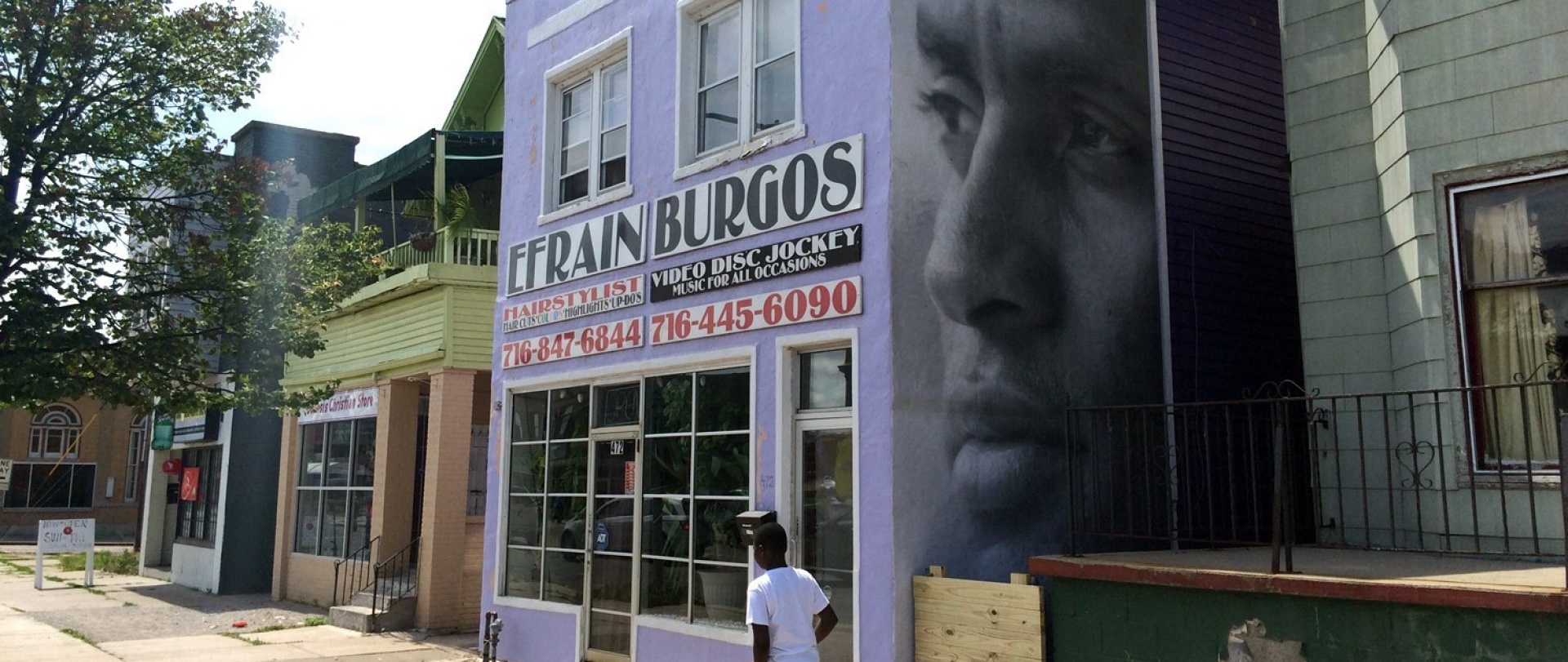
Photo by Newell Nussbaumer, Buffalo Rising (October 3, 2015),
Latinx Heritage at the Intersections of Culture and Crisis
Latinx Heritage Month (September 15-October 15) is an important symbolic gesture at the national level. It signifies that we Latinxs are present in the social, cultural, and political life of the United States, even as we continue to face discrimination and racism.
We fully intend this series of conversations to make a statement that we Latinxs are here at the University at Buffalo, and we are ready to serve as a bridge between UB and the Hispanic communities of Buffalo/Niagara and beyond. However, the speakers in this series – all of them internationally recognized experts in their fields – do not merely “represent” Latinx Heritage…they want to challenge and expand our notion of who “we Latinxs” are. They do so by crossing the intersections between latinidad and other modes of being human, amidst a growing number of global and local crises, and thereby use their academic positions in hopes of altering the worlds in which we actually live. These sessions are not intended as typical academic talks, but rather launching points for conversations with students and the public.
Please preregister for individual events. After registering, you will receive a confirmation email containing information about joining the event.
September 22
4 p.m. | Hip hop at the US-Mexico border: youth, violence and human rights

Professor Héctor Domínguez-Ruvalcaba
Department of Spanish and Portuguese
University of Texas at Austin
Héctor Domínguez-Ruvalcaba is a professor of Latin American Literature and Culture at the University of Texas at Austin. He is author of the books La modernidad abyecta. Formación de discurso homosexual en Latinoamérica (Universidad Veracruzana, 2001), and Modernity and the Nation in Mexican Representations of Masculinity (Palgrave, 2007), Nación criminal: Narrativas del crimen organizado y el estado mexicano (Ariel, 2015), and Translating the Queer. Body Politics and Transnational Conversations (Zed Books, 2016).
September 28
4 p. m. | Translocas: The Politics of Puerto Rican Drag and Trans Performance

Professor Larry LaFountain-Stokes
Department of Romance Languages and Literatures
University of Michigan, Ann Arbor
Lawrence La Fountain-Stokes is Professor and Chair of the Department of American Culture and former director the Latina/o Studies Program at the University of Michigan, Ann Arbor. He is also Professor of Romance Languages and Literatures and of Women’s and Gender Studies. Born and raised in San Juan, Puerto Rico, he received his AB from Harvard (1991) and his MA, MPhil, and PhD from Columbia (1999). He is author of Queer Ricans: Cultures and Sexualities in the Diaspora (University of Minnesota Press, 2009) and of Escenas transcaribeñas: Ensayos sobre teatro, performance y cultura (Isla Negra Editores, 2018) and coeditor with Deborah R. Vargas and Nancy Raquel Mirabal of Keywords for Latina/o Studies (New York University Press, 2017). His book Translocas: The Politics of Puerto Rican Drag and Trans Performance was published by the University of Michigan Press in 2021 as part of the Triangulations: Lesbian/Gay/Queer Theater/Drama/Performance series. He has coedited queer issues of CENTRO Journal, Sargasso, and Hostos Review/Revista Hostosiana and has published two books of fiction, Uñas pintadas de azul/Blue Fingernails and Abolición del pato. Larry performs in drag as Lola von Miramar since 2010, and has appeared in several episodes of the YouTube series Cooking with Drag Queens.
October 5
4 p.m. | Policing, Puerto Rico, and Crisis

Associate Professor Marisol LeBrón
Feminist Studies Department
University of California, Santa Cruz
Marisol LeBrón is an interdisciplinary scholar whose research and teaching focus on race, social inequality, policing, violence, and protest. She is the author of Policing Life and Death: Race, Violence, and Resistance in Puerto Rico (University of California Press, 2019) and Against Muerto Rico: Lessons from the Verano Boricua (Editora Educación Emergente, 2021). Along with Yarimar Bonilla, she is the co-editor of Aftershocks of Disaster: Puerto Rico Before and After the Storm (Haymarket Books, 2019). She is one of the co-creators and project leaders for the Puerto Rico Syllabus (#PRsyllabus), a digital resource for understanding the Puerto Rican debt crisis.
October 14
4 p.m. | The Messiness of Independence: Reflections on the Moment of Mexican Independence on its Bicentennial (1821-2021)

Assistant Professor Sergio Gutiérrez-Negrón
Department of Hispanic Studies
Oberlin College
Sergio Gutiérrez Negrón is a scholar, a writer, and an Assistant Professor of Hispanic Studies at Oberlin College. His current scholarly projects revolve around nineteenth century economic culture and the history of conservatism in post-independent Mexico’s first decades. His most recent article, on the concept of “instituent power” in the country’s first fiscal plan is forthcoming in the Journal of Latin American Cultural Studies.
October 21
4 p.m. | The Place of Blackness in Latinidad

Professor Juliet Hooker
Department of Political Science
Brown University
Juliet Hooker is Professor of Political Science at Brown University. She is a political theorist specializing in racial justice, multiculturalism, Latin American political thought, Black political thought, and Afro-descendant and indigenous politics in Latin America. She is the author of Race and the Politics of Solidarity (Oxford, 2009) and Theorizing Race in the Americas: Douglass, Sarmiento, Du Bois, and Vasconcelos (Oxford, 2017). Her current research project examines the politics of loss, aspects of which have appeared in “Black Protest/White Grievance: On the Problem of White Political Imaginations Not Shaped by Loss,” South Atlantic Quarterly, and “Black Lives Matter and the Paradoxes of U.S. Black Politics: From Democratic Sacrifice to Democratic Repair,” in the journal Political Theory. Hooker has been the recipient of fellowships and awards from the National Endowment for the Humanities, the Woodrow Wilson International Center for Scholars, the DuBois Institute for African American Research at Harvard, and the Advanced Research Collaborative at the Graduate Center of the City University of New York.
October 28
4 p.m. | Indigenous and Latinx Identities as a Horizon of Decolonial Praxis

Associate Professor Joseph Pierce
Department of Spanish Language and Literatures
Stony Brook University
Joseph M. Pierce is Associate Professor in the Department of Hispanic Languages and Literature at Stony Brook University. He is the author of Argentine Intimacies: Queer Kinship in an Age of Splendor, 1890-1910 (SUNY Press, 2019) and co-editor of Políticas del amor: Derechos sexuales y escrituras disidentes en el Cono Sur (Cuarto Propio, 2018) as well as the special issue of GLQ, “Queer/Cuir Américas: Translation, Decoloniality, and the Incommensurable” (2021). His writing has appeared recently in Revista Hispánica Moderna, Latin American Research Review, and Critical Ethnic Studies, and has been featured in Indian Country Today, The Art Newspaper, Hyperallergic, and ARTnews. Along with SJ Norman (Koori, Wiradjuri descent) he is co-curator of Knowledge of Wounds. He is a citizen of Cherokee Nation.
November 2
4 p.m. | Technologies of Contagion: Spores, Viruses, and Queer Latinx Pleasures of Apocalypse

Professor Eliza Rodríguez y Gibson
Associate Dean for Faculty Development and Diversity, Equity, and Inclusion
Chair, Chicana/o and Latina/o Studies
Loyola Marymount University
Eliza Rodriguez y Gibson is Professor of Chicana/o and Latina/o Studies and coauthor of Funny Looking: Humor, Queer Latina/o Camp, and Ugly Betty (Lexington Books, 2015). She is the editor of Stunned Into Being: Essays on the Poetry of Lorna Dee Cervantes (Wings Press, 2012) and coeditor of The Un/making of Latina/o Citizenship: Culture, Politics, and Aesthetics (Palgrave Macmillan, 2014). Her latest book project, Style, Aesthetics, and the Body: Chicana/o/x Cultural Production and the Making of Latinidad examines the way style and aesthetics work on the body to create individual and collective forms of subjectivity. In it, she pays particular to the way Chicana/o/x cultural production works to articulate expansive and liberatory forms of Latinidad. Her latest essay “I Love You Like Chicanos Love Morrissey”: Affect, World-making, and Latinidad,” can be found in the ASAP journal. She serves as Associate Dean of Faculty Development and Diversity, Equity, and Inclusion for The Bellarmine College of Liberal Arts at Loyola Marymount University.
CO-ORGANIZERS
Carlos M. Amador, PhD, is a 2021/22 Distinguished Visiting Scholar at the University at Buffalo through the UB Center of Diversity Innovation’s Distinguished Visiting Scholars Program. He is Associate Professor of Spanish and Culture Studies at Michigan Technological University and the author of Ethics and Literature in Chile, Argentina, and Paraguay, 1970-2000: From the Singular to the Specific. Amador’s current manuscript is titled: Demolición: Aesthetics From The Latinx-American Margins, which explores the central and historically repressed role of political economies of dispossession, informal labor, and non-legal work in US Latinx/Latin American culture. Through his work on political economy and culture, he develops a new theory for Latinx-American aesthetics. His writing also appears in journals like A contracorriente, Revista Argus-A, and E-Flux. Amador also has published several pieces in the Bloomsbury Handbook for Literary and Cultural Theory and a major essay forthcoming in the Routledge Handbook for Literature in The Global South. Amador is also faculty adviser for a number of Latinx and minority student organizations.
Justin Read, PhD, is Associate Professor of Spanish and Portuguese in the UB Department of Romance Languages and Literatures. He works in critical border studies and political theory of Latin America, focusing primarily on Argentina, Brazil, and Mexico. His current book project, The Post-Historical Frontier, examines the automation of border-crossing and its impact on citizenship, sovereignty, and national narrative. His articles have appeared in Journal of Latin American Cultural Studies, Revista de Estudios Hispánicos, Modernism/Modernity, Luso-Brazilian Review, and Cuaderno de Literatura, among others. Read is Mexican-American, and like the Cuban-American Professor Amador, grew up in Southern California.
SPONSORS
Carlos Amador, PhD, UB Center for Diversity Innovation Distinguished Visiting Scholar
Justin Read, PhD, Associate Professor of Romance Languages and Literatures
UB Department of Romance Languages and Literatures
UB Center for Diversity Innovation
UB College of Arts and Sciences
These events and others may also be found on the Center for Diversity Innovation’s website for the Distinguished Visiting Scholars Program.